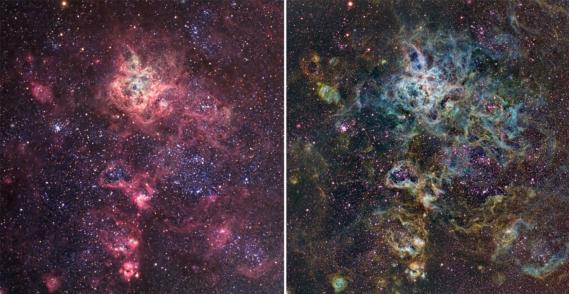The Tarantula in Traditional RGB vs Narrowband
 Click Image for full size view Warning: Full size images can be very large |
By |
Catalog |
Obj Type |
Location |
Date Taken: |
SSRO |
NGC 2070 |
Nebula |
CTIO, Chile |
11-30-2008 |
Description |
||||
Here we present the well known Tarantula Nebula & surrounding region, a showpiece of the southern sky, in both a traditional version using RGB filters (assembled as an RRGB), and also a narrowband version (using SII=Red, Ha=Green, and OIII=Blue -- aka the Hubble palette.) Note that the SII emission line at 672 nm AND the Ha emission line at 656 nm are both in the red portion of the visible spectrum; thus, assigning SII=Red and Ha=Green is, of course, inaccurate from the standpoint of what our eyes would see in the nebula (if they were able to detect color at such a low intensity), but nevertheless serves to enhance detail in the image as it differentiates two of the nebula's components that would otherwise get lumped together by traditional broadband filters. Please also realize that the NII emission line at 658 nm is so close to the Ha emission line at 656 nm, that the Ha filter's bandpass (7 nm in the Baader line) doesn't really allow us to separate the two, and the Ha data is best thought of as a combination of both. Finally, the OIII emission line at 501 nm, is in the teal portion of the visible spectrum between green and blue, and fairly well represented by assigning it to blue in the final image. Click here for a higher resolution version of the RGB image. Click here for a higher resolution version of the Narrowband image. |
||||
Technical Details |
||||
Exposure Time: |
RGB: RRGB with 48 min/channel; NB: SII(4hrs)-Ha(9 hrs)-OIII(5 hrs) | |||
Camera: |
SBIG STL-11000M | |||
Telescope: |
Takahashi FSQ106N | |||
Mount: |
Software Bisque Paramount ME | |||
© 2024 SSRO Used with permission, No reproduction of these images are permitted without written approval from SSRO. |
||||
